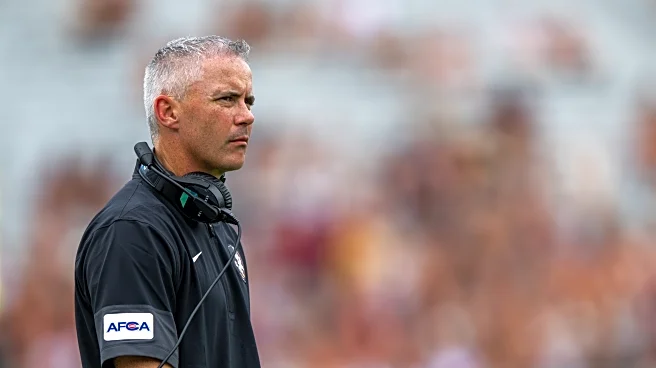Before the season, and before Virginia became a top-20 team, Pitt was the game circled on the calendars as a “trap game.”
A week after a rival, against a veteran group, for an early start always feels like a bad spot. While some of that concern subsided due to the Panthers coming into Tallahassee 3-2 and already making a quarterback change before the midway point of the season, there is much more to Pitt that meets the eye. Similar to Florida State, Pat Narduzzi’s team could easily be 5-0 right now
if not for a couple of breaks and self-inflicted wounds. The Panthers had over an 85% chance to win in both of their losses, including racing out to a 17-0 lead over Louisville at home and having a 98.4% win probability versus West Virginia the week prior.
The last time these sides met, the Seminoles stared down a 14-0 hole if not for a goal-line fumble forced by Azareye’h Thomas. Vegas may have FSU as a double-digit favorite, but Mike Norvell’s team will need their best. Below are three keys for the Seminoles to get off the schnide.
No. 1: Control Pitt’s passing attack
Even though the Panthers decided to make a quarterback change, it was not because of an inability to push the ball down the field. Pitt ranks 10th in the country in passing yards per game and is one of 13 schools averaging over 300 passing yards per game (308.3). Part of the passing attack proficiency comes from a plethora of prolific wide receivers inside the Pitt locker room. Three different Panther wideouts have recorded over 100 yards in a game this season, and all three have played three college football seasons or more. Raphael Williams Jr., a senior who began his career at West Carolina, currently leads the Panther WR room with 320 yards on the year with an average of 17.8 yards per catch. With a trio of options, Mason Heintschel passed for 359 yards on 45 attempts in his collegiate debut against Boston College last week.
There is no reason that the game plan should change for Pitt on Saturday, considering the Panthers have not had a runner gain over 70 yards or more in a game (even though RB Desmond Reid should return), and the Seminoles are banged up on the back end. Mike Norvell announced earlier this week that DB Quindarrius Jones will miss the rest of the year due to injury, and S Ashlynd Barker is questionable with an ailment. Miami gained 207 passing yards on five plays last week and Pitt will test the FSU secondary frequently. The Noles must prove early and often that they are up to the challenge and put a stop to the Panthers’ passing attack.
No. 2: Win the turnover battle
As mentioned earlier, both of these teams could be 5-0 and inside the top 20 if they held onto the football. During their overtime loss to Louisville earlier in the season, Pitt fired two fourth-quarter interceptions, which proved fatal. The main reason it appears the Panthers shifted gears to a true freshman comes from the turnovers of his predecessor. Eli Holstien was benched after sligning five picks in four starts, including an interception in every game he began under center. Pitt ranks 78th in the country in turnover margin at -0.20 with eight turnovers in eight games. Of course, their opponent in Tallahassee is having an even harder time holding on to the ball. Florida State ranks 104th in the country in turnover margin at -0.60 and Tony White’s defense has yet to recover a fumble through five weeks. Norvell and the players harped all week about the need to protect the ball exponentially better than they have in the last two weeks. It certainly appears that the winner of the turnover battle will be the winner on Saturday.
No. 3: Jump out to an early lead
This may sound hard to believe, but Pitt has not allowed a first-quarter point this season. Zero. They also lead the country in opponents’ yards per rush at 1.9, the only team in the country under two yards per carry. However, there is room to be had against the Panther defense later in the game as Pitt has averaged 7.8 fourth-quarter points, which ranks 90th in the country.
All of this is to say that the Noles need to jump out in front early. First, Florida State cannot afford to have its run game taken away from it so early in the game, as it did against Miami. The Seminoles’ offense thrives on balance, and if Pitt does not allow FSU to get the run game going early on, Tommy Castellanos will need to carry the offense with his arm, a hit-or-miss proposition to begin the year.
The Seminoles have fallen behind by double digits in the first half during their last two losses, and clearly they are not talented enough to dig themselves out of early holes. Moreover, regardless of what the players say, dropping two straight games can damage confidence. A strong start will get the crowd into it and allow FSU to start playing on its terms, something it has not done over the last two weeks.
















